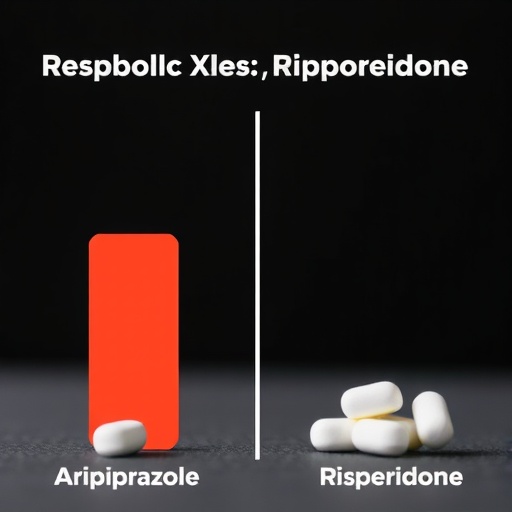In the continuously evolving landscape of schizophrenia treatment, addressing the metabolic side effects of antipsychotic medications remains a crucial challenge for clinicians and researchers alike. A groundbreaking randomized double-blind controlled clinical trial recently published in BMC Psychiatry sheds new light on the comparative metabolic impacts of two widely prescribed second-generation antipsychotics (SGAs), aripiprazole and risperidone. This study not only deepens our understanding of these medications but also prompts a reevaluation of clinical strategies aimed at minimizing long-term cardiovascular risks among patients living with schizophrenia.
Antipsychotics, particularly SGAs, have transformed schizophrenia management by offering improved efficacy and tolerability over first-generation agents. However, a significant downside is their propensity to induce metabolic alterations including weight gain, dyslipidemia, and glucose dysregulation. These metabolic disturbances significantly elevate the risk for cardiovascular diseases, contributing to the diminished life expectancy observed in this population. While aripiprazole and risperidone are among the most commonly deployed SGAs, their differential influence on metabolic parameters outside the framework of first-episode psychosis had remained insufficiently characterized until now.
Conducted over the course of seven weeks, this rigorous trial enrolled 60 patients with established schizophrenia diagnoses. Participants, either naïve to antipsychotic treatment or after a washout period, were randomized to receive either aripiprazole (dosed from 5 to 30 mg/day) or risperidone (2 to 10 mg/day). The study’s primary endpoint centered on changes in body mass index (BMI), a key metric linked to metabolic risk. Secondary outcomes included waist circumference, blood pressure, fasting lipid profiles, treatment-emergent adverse events (TEAEs), and detailed assessments of changes in appetite—an often overlooked but potentially critical factor in metabolic health.
Upon completion, with 57 patients adhering through the full seven-week period, the results were striking. Individuals treated with risperidone exhibited a notably greater increase in BMI compared to those receiving aripiprazole, with mean changes of +1.1 ± 0.3 versus +0.4 ± 0.2, respectively, a difference that was highly statistically significant (p < 0.001). This finding underscores the more pronounced weight gain linked to risperidone over a relatively short treatment window, a factor that could predict longer-term metabolic complications if left unchecked.
In addition to weight metrics, the lipid profile trends further differentiated the two drugs, although these differences did not achieve statistical significance in this study. Patients on risperidone experienced larger elevations in triglycerides (+28.1 mg/dL vs. +7.3 mg/dL) and total cholesterol (+5.1 mg/dL vs. +0.1 mg/dL) compared to their aripiprazole counterparts. These shifts, while subtle, align with a broader pattern associating risperidone with adverse lipid changes, which, in clinical contexts, contribute cumulatively to cardiovascular risk.
Arguably, one of the most novel aspects of this investigation was its nuanced exploration of appetite changes as a mediating mechanism linking antipsychotic treatment to metabolic outcomes. Remarkably, appetite suppression was significantly more prevalent with aripiprazole (60.7% of patients) than with risperidone (20.7%), whereas increased appetite was more commonly reported by patients treated with risperidone (55.2% vs. 39.3%). This dichotomy in appetite effects not only offers plausible biological explanations for the differential weight gain observed but also highlights appetite monitoring as a feasible early clinical marker for subsequent metabolic trajectory.
Beyond metabolic concerns, the trial verified that both antipsychotics were comparably effective in reducing psychiatric symptoms, as measured by the Positive and Negative Syndrome Scale (PANSS). Baseline demographics, illness duration, and initial symptom severity were similar across groups, bolstering confidence that metabolic differences were attributable primarily to pharmacological properties rather than confounding clinical variables.
The methodological robustness of this study is noteworthy. The double-blind design minimized bias, while generalized estimating equations (GEE) addressed missing data, ensuring analytical rigor. Compliance, a common challenge in psychopharmacological trials, was carefully monitored using pill counts and structured interviews, confirming adherence without compromising data integrity.
Clinically, these findings advocate for a more personalized approach in antipsychotic therapy, emphasizing metabolic risk profiles alongside psychiatric efficacy. The relatively favorable metabolic footprint of aripiprazole, particularly its association with appetite suppression and less weight gain, may guide clinicians in tailoring treatment plans, especially for patients predisposed to cardiometabolic disorders. Moreover, incorporating routine appetite assessments during antipsychotic initiation could serve as a simple yet powerful tool to anticipate and mitigate adverse metabolic outcomes.
This study also invites future research trajectories. Longer-term investigations are essential to fully characterize the cumulative metabolic effects of these medications over extended treatment periods. Elucidating the neurobiological underpinnings of appetite modulation by different antipsychotics could unlock novel therapeutic targets, potentially enabling the development of agents that minimize metabolic risk without sacrificing antipsychotic efficacy.
In sum, the research presents compelling evidence that differentiates aripiprazole from risperidone not only in metabolic consequences but also in the clinical potential to leverage appetite changes as predictive markers. Such insights mark a significant advance in schizophrenia care, with the promise to enhance patient quality of life through harmonized management of psychiatric and metabolic health.
As schizophrenia remains a chronic condition demanding lifelong intervention, integrating metabolic risk assessment and mitigation into standard clinical protocols is more imperative than ever. The nuanced profiles unveiled by this trial reinforce that the choice of antipsychotic medication extends beyond symptom control, encompassing a broader commitment to safeguarding long-term physical wellness.
Ultimately, studies like this set the stage for a paradigm shift towards truly individualized schizophrenia treatment, harmonizing psychiatric stabilization with metabolic preservation. The clinical community and patients alike stand to benefit from these evidence-based refinements, making strides toward more holistic and sustainable therapeutic outcomes.
Subject of Research: Metabolic impacts of aripiprazole versus risperidone in schizophrenia treatment
Article Title: Assessing the metabolic impact of aripiprazole versus risperidone in the treatment of schizophrenia: a randomized double-blind controlled clinical trial
Article References:
Rahimi Darehbagh, R., Ghanizadeh, A. & Seyedoshohadaei, S.A. Assessing the metabolic impact of aripiprazole versus risperidone in the treatment of schizophrenia: a randomized double-blind controlled clinical trial. BMC Psychiatry 25, 1097 (2025). https://doi.org/10.1186/s12888-025-07496-7
Image Credits: AI Generated
DOI: 18 November 2025




